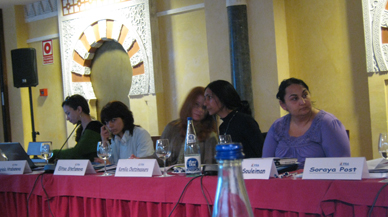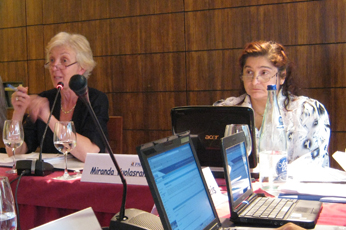11.04.2010FRA Round table with Romani and Travellers women activists 'On a Road to Equality'
 On the eve of the International Roma Day (8 April) and the Second European Roma Summit, the Fundamental Rights Agency held a round table with Romani and Traveller women networks in Córdoba (Spain). The aim of the meeting “On a Road to Equality” was to provide space for Romani and Traveller women to discuss the gender dimensions of inequality and in particular how to promote the gender dimension in the agenda of the II Roma Summit and EU policies in general. The roundtable brought together representatives from the European Commission, the Fundamental Rights Agency and Romani women activist networks. Discussions focused on European Union policies on Roma and Romani and Traveller women and the 10 Common Basic Principles on Roma inclusion, facilitating the application of these policies at local level and anti-gypsyism, hate crime and other forms of intolerance.
On the eve of the International Roma Day (8 April) and the Second European Roma Summit, the Fundamental Rights Agency held a round table with Romani and Traveller women networks in Córdoba (Spain). The aim of the meeting “On a Road to Equality” was to provide space for Romani and Traveller women to discuss the gender dimensions of inequality and in particular how to promote the gender dimension in the agenda of the II Roma Summit and EU policies in general. The roundtable brought together representatives from the European Commission, the Fundamental Rights Agency and Romani women activist networks. Discussions focused on European Union policies on Roma and Romani and Traveller women and the 10 Common Basic Principles on Roma inclusion, facilitating the application of these policies at local level and anti-gypsyism, hate crime and other forms of intolerance.
Bulgaria was represented by Teodora Krumova from Center Amalipe and Elitsa Stefanova from Integro Association. Teodora Krumova raised the issue that the problems of Romani and Traveller women are rather segregated within principle 5 “Awareness of the gender dimension”. In order to achieve gender equality we should definitely introduce the gender principle in the agenda of all the other nine principles. Sabiha Souleimanfrom Antirropon – Greece shared that women at the grassroot level often do not even know that they have rights what about to fight for them. Letitia Mark (Roma Women Association ‘For our children’) appealed Roma culture and tradition not to be used as an excuse and pretext for Romani and Traveler Women discrimination and neglecting of their rights. Enisa Eminova from Macedonia reminded that speaking about Romani women rights is speaking about human rights and speaking about harmful practices in the Roma community is not a betrayal of the community. But again the problem comes to the lack of data about Romani women and the lack of strategic policy paper. Therefore, we should insist on including explicitly Romani women issues in the EU Roma Strategy.
Another issue raised in the discussion is how EU instruments promote Romani women equality. Many of the participants shared that practically at present no one makes use of the available EU instruments which create a favorable framework for enhancing gender equality. Ostalinda Maya from ERRC stressed that EU should ensure that structural funds were not provided to institutions, which participated on human rights violation of Roma, such as segregated schools, hospitals, which perform forced sterilisation of Romani women etc. Teodora Krumova pointed that the  gender dimension in EU structural funds should be ensured practically, not just nominally. At present all project in Bulgaria, for example, should account on how they promote the gender principal and the inclusion of Roma. This statistic however is provided just nominally and often without any real measures. In this respect and in order to contribute to achieving gender equality Alina Covaci from the Public Health Program of OSI suggested the establishment of a concrete office dealing with Roma gender equality.
gender dimension in EU structural funds should be ensured practically, not just nominally. At present all project in Bulgaria, for example, should account on how they promote the gender principal and the inclusion of Roma. This statistic however is provided just nominally and often without any real measures. In this respect and in order to contribute to achieving gender equality Alina Covaci from the Public Health Program of OSI suggested the establishment of a concrete office dealing with Roma gender equality.
A number of other issues have been brought to the discussion such as the continuing violence against Romani women as we have witnessed in recent months in the Czech Republic in Vitkov and Opava, Hungary and Italy in Ponticelli, etc, the poverty, and so on.
Finally the women participating in the two day meeting came up with a position paper which had several major points:
- There is a need for both mainstreaming and targeted approaches in addressing the situation of Romani and Travellers women in all EU and Member States policies. Gender needs to be included in all Common Basic Principles on Roma Inclusion.
- There is a need to draw attention to the increasing poverty of Romani communities and to the increasing polarisation in the society, which results from anti-Gypsyism. Especially in the time of crises, Romani women and children are even more affected.
- The European Commission should develop EU Roma Strategy. In order to ensure Romani and Travellers women access to human rights, we should be consulted on a regular basis in all stages of strategy making, implementation, monitoring and evaluation process.
- European Commission in the next programming period 2014-2020 should make the Structural Funds more accessible, flexible and develop micro credit programmes, which would support the grassroots Romani women and interlink small programmes, which already exist. EU should ensure that structural funds are not provided to institutions, which participate on human rights violation of Roma, such as segregated schools, hospitals, which perform forced sterilisation of Romani women etc.
- There is a need to raise awareness of fundamental rights with the Romani communities as well as with the service providers, who need to be more aware of and responsive to community needs and of their obligations in this regard.
- There is a need to be a critical reflection on what the First Roma Summit has brought to Romani communities. Concrete commitment of Member States needs to be in place for the outcomes of the II EU Roma Summit.
The whole paper can be downloaded here.








